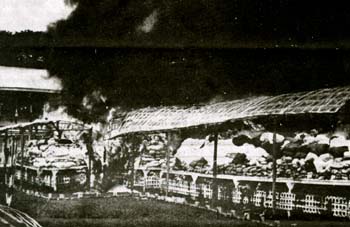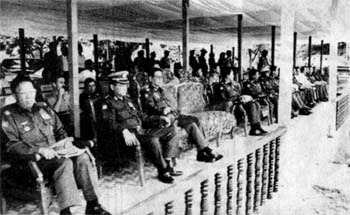The New Light of Myanmar
Sunday, 9 July 2000
Poppy Cultivation
Eradication Project
 The Union of Myanmar
The Union of Myanmar
for so many sovereign country. The Myanmar nationals have been living together sharing
weal or woe unitedly under the reign of own monarchs.
During the reign of King Bodawphaya (King Badon) issued the order on his enthronement that abusing of
any narcotic drugs such as alcohol, poppy, etc were prohibited.
In the notification dated 20-2-1782 stated that deterrent action was to be taken
against production and trafficking of all narcotic drugs such as alcohol, opium, etc.
In the third gazette dated 7th waxing day of Tabodwe in the 37th year of the King’s reign, it was
mentioned “Abuse of opium is not practised among Myanmar people and those who abuse opium must be
arrested and jailed. They must be released only after pledging that they will not
to do so again. Neither production nor abusing of opium must be made in the future and violaters must be
given death sentence.” Throughout the history, Myanmar people are honest, polite
and strong minded. They have ardent patriotic spirit, Union Spirit and the love for the nation.
Due to unjust occupation of the British colonialists. Myanmar fell under. servitude on
1-1-1886. The colonialists introduced poppy cultivation to our country. When the colonialists left our
country, there were 216 opium dens and 48,212 opium addicts in Myanmar. The unregistered addicts of
opium were much more than that amount.
As an evil heritage of the colonialists, there left the narcotic drug problem
in Myanmar. We are today combating the danger of narcotic drugs as a national duty.
Regarding the drugs abuse control, Myanmar has signed
the 1961, 1971f and 1988 UN conventions and been implementing resolutions.
Myanmar is co-operating actively with the international organizations in combating the drug menace. On the other hand, it is making efforts on self-reliant basis to wipe out the drug menace as a national duty.
State Peace and Development Council Chairman Defence
Services Commander-in-Chief Senior General Than Shwe has given guidance on eradication of opium cultivation in border areas. He said that the main aim of the border areas
development works is to eradicate poppy cultivation and enable the local people to earn livelihood properly.
In border areas, the national brethren have inherited the poppy cultivation as an evil heritage of the colonialists. To wipe out that evil heritage, efforts were made to enable them to earn livelihood properly.
The Central Committee for Drug Abuse Control and work committees were formed in 1975 to effectively carry out the drug abuse control tasks. Strategies and Tactics were also laid down for preventing the dangers of narcotic drugs.
Programmes were laid down for effective implementation of the Three Tactics namely Supply Elimination, Demand Elimination and Law
Enforcement.
Regarding the development of border areas, the Ministry for Progress of Border Areas and National Races and Development Affairs was formed. Opium
cultivation was substituted with agriculture and livestock breeding activities. From 1989 to’ date, the
Government has spent 18,497.12 million kyats in border areas and
national races development.
In cooperation with UNDCP, the integrated socio-economic development plans of opium growing areas and the opium cultivation scrutinization plans were implemented. With Japanese aids, opium-substituting buck-wheat cultivation is
carried out. In cooperation with the People’s Republic of China, measures for cultivating poppy substituting crops are being taken.
Joining hands with Karamosia International, an NGO, Wa region
development plan is being implemented. Due to these efforts, the poppy cultivation and
production have remarkably declined.
Eradication of opium cultivation
At the meeting No 35/98 of the Myanmar Government held on 7-10-98, the Prime Minister gave guidance to notify that a 15-year plan will be implemented
beginning 1999-2000 for wiping out poppy
cultivation effectively. Accordingly, the CCDAC is drawing up plan for eradicating
narcotic drugs menace. The 15-year long term plan will be implemented through 5-year plans.
In the first 5-year period, priority areas will be designated as 15 townships in
northern Shan State, one township in eastern Shan State, and six townships in southern Shan State. In the
second 5-year period, priority areas will be designated as 4 townships in Kachin
State, 7 townships in northern Shan State, 7 townships in eastern Shan State, and
three townships in southern Shan State. In the third 5-year period, priority areas
wi11 be designated as 5 townships in southern Shan State, 2 townships in Kayah State,
and 2 townships in Chin State. The whole project covers 51 townships with total area of
55102.454 square miles inhabited by 3,817,199 people in 1,469 village-tracts. Eradication
of poppy cultivation, control of narcotic drugs abuse, participation of local populace
and cooperation with international organizations will be given priority.
Now, the Government is implementing the first 5-year project of the 15-year opium
eradication plan which commenced in 1999-2000. Based on the 51 townships, production eradication, abuse
elimination, law enforcement, people’s participation and international relations will be targeted. The estimated costs of the plan are 33,588.14 million kyats and 150 million
US dollars.
While the Government is taking measures for wiping out the drug menace, the
Tatmadaw, Police Force, Customs Department and other organizations are
taking action against the drug trafficking. Seized narcotic drugs are destroyed
occasionally. The 14th Destruction of seized drugs was held on 23-6-2000 at Aung Thabye Ye Yeiktha on Kyaikwaing Pagoda Road in
Yangon. Altogether 800 to 1,000 million US$ worth of opium, heroin, opium oil, liquid opium, marijuana,
phensedyl, stimulant tablets, ephederine, opium comprising cough syrup and tablets, injections methadone, phenyl-acetic acid, etc were destroyed.


Myanmar is markedly reduced the poppy cultivation and this leads to decline in heroin production. On the other hand, production of other forms of narcotic
tablets and trafficking are still on the rise. Being a sovereign country, Myanmar is combating the drug menace as a national duty through strategies and tactics in the interests of the country,
region and the world.
Eradication of poppy cultivation in the north-east of the country is attributable
socio-economic uplift and better transportation. Hence, efforts for the purpose are also made simultaneously.
An encouraging achievement in this regard is that the armed groups there have returned to legal fold and joined hands with the
Government in regional development activities. In fact, it is the
essential requirement for wiping out the drug menace in 15 years.
Before the UNDCP asked Myanmar to draw up a 10, year plan for drug issue, we had drawn up the 15-year plan. It
shows that Myanmar will combat the drug menace with own resources and strength whether it receives any external assistance or not.
In the north-east of Myanmar, the
formerly notorious Mongla region has been declared as a drug free zone in April 1997. The
Kokang region will be declared so in 2000 and the Wa region in 20C5.
Constant efforts are evident that Myanmar is leading to the victory of total annihilation of narcotic drugs menace.
Article :
Tekkatho Tin Kha
![]()